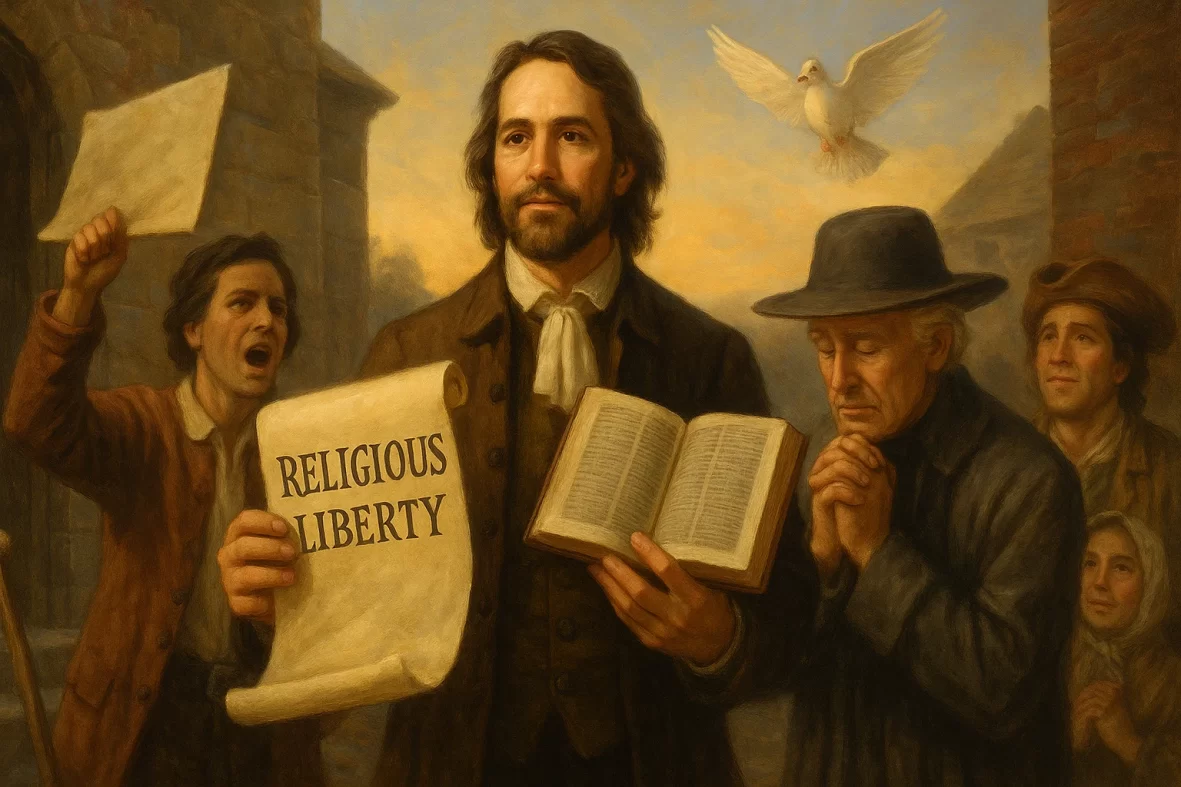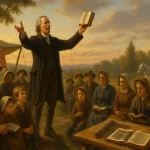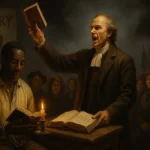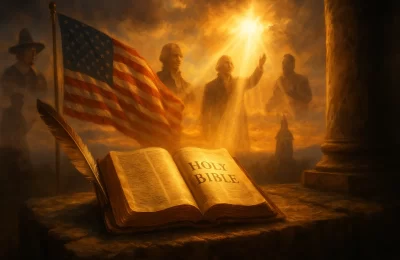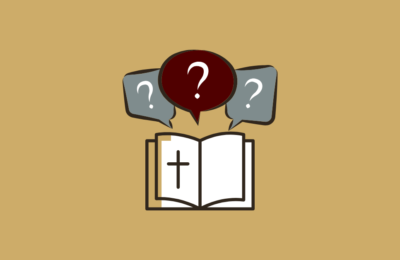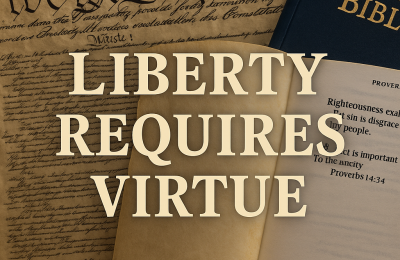Part 8 of Civic Theology: How the Bible Shaped America’s Founding and Freedom
For most Americans today, singing in church or praying at home without fear seems so ordinary that we hardly notice it. Yet for millennia, few people in history enjoyed such soul liberty. In medieval Spain and elsewhere, government and church were one; to resist meant torture or death. The Spanish Inquisition’s “brutal methods led to widespread death and suffering” as Catholic monarchs enforced religious uniformity . One historian notes that in 1391 Spanish Jews faced mass slaughter or forced conversion . By contrast, the New World was a vast experiment in freedom of conscience. Long before the United States existed, pioneering colonists proclaimed that no government should rule the heart. Roger Williams, a Puritan minister turned Rhode Island founder, insisted that “forced worship stinks in God’s nostrils” – a principle he fleshed out in The Bloody Tenent (1644) and ultimately in Rhode Island’s 1663 charter. That charter, granted by King Charles II, explicitly guaranteed that “no Person… shall be any wise molested…for any differences in opinion in matters of religion,” and that all could “freely and fully…have and enjoy his and their own Judgments and Consciences, in matters of religious concernments” .
The Biblical roots of conscience and religious liberty run deep. The Bible portrays conscience as God-given: “the thoughts of the righteous are just,” but “the counsels of the wicked are deceit” (Proverbs 12:5–6, NASB). In the New Testament, Jesus himself drew a clear line between earthly and heavenly duty: “Render therefore unto Caesar the things which are Caesar’s; and unto God the things that are God’s” (Matthew 22:21 KJV). In other words, government’s realm and God’s realm are distinct. The Apostle Paul echoes this: in Romans 14 he reminds believers that nothing is unclean in itself apart from conscience (Rom. 14:14–15) – meaning God alone assigns religious significance. He warns that though Christians are “called to freedom” (Galatians 5:13 ESV), this freedom must not be used selfishly but “through love serve one another” (Gal. 5:13–14) . Indeed, 2 Corinthians 3:17 says simply, “Now the Lord is the Spirit; and where the Spirit of the Lord is, there is liberty” . We obey God from conviction, not from human force: Peter’s famous declaration on this point – “We must obey God rather than men” (Acts 5:29) – is engraved in the American founding ethos. Even Scripture commands a balanced respect: “Honor all people, love the brotherhood, fear God, honor the king” (1 Peter 2:17 ESV) – indicating we submit to law, yet acknowledge that ultimate allegiance is to God alone. And in Revelation, those who are “beheaded for the testimony of Jesus and for the word of God” are vindicated and reign with Christ . These themes – conscience, freedom in Christ, obedience to God, and reverence for earthly authority – form a Christian theology of conscience that became woven into America’s birth.
Importantly, the Bible portrays grace as the basis of salvation, not human coercion (Ephesians 2:8–9). If salvation is by grace through faith, so too true worship must be a free gift of God’s Spirit, not something governments can commandeer. The Puritan theologian Jonathan Edwards observed that genuine faith “cannot be propagated by outward force.” In this spirit, Roger Williams and other reformers argued that civil magistrates have no power over a person’s soul. Williams famously wrote in The Bloody Tenent that making one religion a civil law is “murder, robbery, and perjury.” He introduced the term “soul liberty” to describe each person’s right to follow conscience. God alone is Lord of the conscience, as no uniform can truly cover the heart.
Seeds of Liberty in Colonial America
Armed with these Biblical convictions, American colonists charted a new course. The first tentative steps toward religious liberty were made in the seventeenth century. Maryland’s Toleration Act of 1649, for example, proclaimed that “no person… shall be any waies troubled, molested or discouraged for… his religion, nor in the free exercise thereof” . (The caveat was that it applied only to Christians who accepted the Trinity – still a bold departure from English practice.) In Rhode Island – founded in 1636 by Roger Williams after his banishment from Massachusetts – civil documents promised even broader freedom of conscience. King Charles II’s 1663 charter declared that residents would have “full liberty in religious concernements,” and that no one “shall be molested…for any differences in opinion in matters of religion,” so long as they did not disturb civil peace . This was unique: Europe’s kings forbade such tolerance. In France, England, or Spain, dissenters faced fines, exile or worse. In colonial Virginia, even Baptists were sometimes jailed in the 1700s for holding unauthorized worship services.
The Enlightenment further shaped the idea that belief cannot be compelled. Revolutionary-era patriots began explicitly tying freedom of conscience to human dignity. George Mason’s 1776 Virginia Declaration of Rights (influenced by Thomas Jefferson) declared that “all men are equally entitled to the free exercise of religion, according to the dictates of conscience.” James Madison, writing Memorial and Remonstrance Against Religious Assessments in 1785, echoed this with deep conviction. He argued that religion is an “unalienable right” and insisted that every person’s mind must remain “free” – no law could coerce belief . Madison wrote that all people “enter society on equal conditions,” retaining “an equal title to the free exercise of Religion according to the dictates of Conscience” . He pleaded that no government had a right to tax people to support a church: faith cannot be bought by taxes, since God commands free worship.
Madison was not alone. Thomas Jefferson, in Virginia’s Statute for Religious Freedom (1786), famously wrote, “Almighty God hath created the mind free; all attempts to influence it by temporal punishments… are a departure from the plan of the Holy Author of our religion” . (Jefferson even said God, “being Lord both of body and mind, yet chose not to propagate [religion] by coercions on either.”) After independence, the states experimented with varying degrees of church–state separation, but Virginia’s example set the pattern. Jefferson and Madison, steeped in Scripture and liberty, helped draft the federal Constitution. By 1791, the First Amendment enshrined their vision: “Congress shall make no law respecting an establishment of religion, or prohibiting the free exercise thereof” . In effect, this double clause meant the government must neither impose a national faith nor stop anyone from worshiping as they see fit. It echoed the Biblical balance: honor Caesar with taxes and order (Matt. 22:21), but honor God with heartfelt worship.
To see how radical this was, contrast it with Europe. In England, the monarch was head of the Church of England; Catholics and Dissenters endured legal penalties. In Spain and much of Catholic Europe, the Inquisition crushed any deviation: even talking to a Protestant could mean being burned at the stake . “Toleration” in those lands was a grudging exception, not a birthright. America’s founders had lived through waves of European persecution and rejected them utterly. Roger Williams had fled “church by government fiat” in England and Massachusetts, insisting on a “hedge or wall” (his words) between church and state. Centuries of suffering – from St. Bartholomew’s Day Massacre in France to the Nine Years’ War in Ireland – taught them that enforced religion only spread hypocrisy and terror. Franklin and others remembered how England’s Test Acts barred non-Anglicans from office. Against that backdrop, the U.S. commitment to “soul liberty” indeed seems a miracle of mercy, rooted in God’s image-bearing of conscience.
Stories of Conscience in Action
These principles weren’t just abstract; Americans lived them in everyday life. Imagine a Quaker farmer in colonial Pennsylvania. Asked to serve in the militia, he holds firm to Christ’s teaching to “turn the other cheek.” He refuses to bear arms or swear an oath to fight, even during war. As one scholar notes, Quakers “had a history of going to jail for their beliefs – for refusing to swear oaths, for refusing to bear arms” . In 1650s England, thousands of Quakers were imprisoned rather than take up arms or take communion in the state church. In the American colonies, that pacifist Quaker would likewise face fines or jail. Yet even the strict Puritan magistrates who judged him couldn’t ultimately change his conscience. For the Quaker, it wasn’t a clever legal ploy but “a fundamental duty of the Christian to suffer rather than obey” when law and Gospel collide . In this way, Americans learned that religious freedom meant protecting even the unpopular dissenter.
Consider the story of America’s Jews, who for much of history had often been barred from civil rights in Europe. In 1790 President George Washington assured the Hebrew Congregation of Newport, Rhode Island, that in the new nation “all possess alike liberty of conscience and immunities of citizenship” . Washington declared that the United States “gives to bigotry no sanction, to persecution no assistance” . Because of this promise, a Jewish immigrant in the early republic – for the first time in centuries – could attend synagogue openly, build a congregation, or read Scripture publicly, without fear of state retaliation. Earlier in Europe, Jews lived under curfews or the threat of expulsion. In America they could even petition the president without penalty. A grateful Rhode Island Jew wrote later that their plea for religious freedom “was answered in this land by the universal philanthropy of every class of the community.” This kind of religious liberty drew many persecuted people to American shores.
Even later, in the 19th and 20th centuries, immigrants from Czarist Russia or Nazi Europe expressed wonder at free worship. One Jewish family, having escaped pogroms, later recalled with tears how they could now build a synagogue and pray without watching their backs. Such stories illustrate the key point: our rights are God-given, not government-granted. As Madison wrote, religion is an “unalienable right” of every person – meaning no mortal should take it away.
A Contrast with Europe
Across the Atlantic, things remained grim. Even as Americans prized conscience, overseas monarchs hung and burned dissenters. In 1563, Henri IV of France famously declared that “Paris is well worth a Mass,” but he only issued the Edict of Nantes (granting rights to Huguenots) after decades of savage warfare. By 1685 King Louis XIV revoked it; tens of thousands of French Protestants fled or converted under threat. England had the Glorious Revolution in 1688, yet Catholics and non-Anglican Protestants remained legally handicapped until the 19th century. In Spain and Portugal, the Inquisition forced forced conversions; many “conversos” (converted Jews or Muslims) were still persecuted on suspicion of old beliefs. Even 18th-century Austria jailed anyone not in communion with the state church.
None of this was unfamiliar to America’s founders. John Adams knew European wars of religion all too well. Benjamin Franklin observed in London that no “Toleration” law had been passed by Parliament; liberty of conscience was simply assumed or not. It is a mark of divine kindness, then, that American officials repeatedly enshrined the freedom of conscience. In 1786, Jefferson wrote that the Virginia law “gave no sanction to bigotry, no aid to persecution.” A century later, when injustice still raged abroad, President Ronald Reagan celebrated this heritage: proclaiming 1983 “Year of the Bible,” he reminded Americans that even dictators who “crush religious freedom” cannot extinguish the faith in believers’ hearts . Reagan quoted the remarkable faith of America’s Founders – George Washington’s inaugural use of the Bible, John Adams calling it “the best book” – and declared that our constitutional religion clauses were “worth preserving.”
The result of all this is a true American miracle of mercy. Today, churches, synagogues, mosques, and even atheists freely voice their beliefs. No American is fined for missing church, no believer is imprisoned for a prayer. Even unpopular sects – Jehovah’s Witnesses, Mormons, Orthodox Jews – have thrived here in ways impossible in 18th-century Europe. Families teach their children whichever faith they choose, knowing the Constitution backs them. This pluralism is not an accident but the fruit of “true piety rightly grounded upon gospel principles,” as King Charles’ charter put it – which “will give the best and greatest security to sovereignty” . In other words, a culture that honors individual conscience and grace is at once godly and strong.
Yes, America’s brand of religious liberty was almost unheard-of in the world at its founding. Yet it is biblically faithful: it reflects the conviction that “to one who does not work, neither should he eat, but rather that he should believe and trust in God” (Acts 5:29, paraphrased). The First Amendment’s promise was more than law; it was a practical outworking of Gospel truth. In a 19th-century sermon President Lincoln noted that America rests “upon the infinite justice of God” – including the justice that every heart should worship God freely.
Key Scriptures and Principles: Our tradition can be summed up in Scripture’s own words. The Bible teaches that God “has made us free” (Gal. 5:1) – not free to sin, but free from bondage so that we can serve one another in love. Conscience is honored: “nothing is unclean in itself” (Rom. 14:14). Christ Himself insisted on splitting “the things of Caesar” from “the things of God” (Matt. 22:21) – a principle the First Amendment echoes by splitting church and state. We remember that we answer first to God: if human law ever commands what God forbids, Christians must obey God rather than men (Acts 5:29). At the same time, we honor authorities (1 Peter 2:17) by being good citizens and neighbors, trusting that this very liberty was intended by Providence.
These convictions invite us to thank God for religious liberty, not take it for granted. As J. Vernon McGee might wryly note, we have yet to see congregations tied down and sold as state property – something early Christians hardly imagined. Charles Spurgeon might add that in American pews, the preacher is free to speak “words of God’s grace” without an “ecclesiastical spy” in the back row. And Eric Metaxas would point out that this story is a history worth telling: thanks to humble founders like Roger Williams and James Madison (and yes, preachers and pilgrims thousands strong), a new nation’s charter declared that conscience is inviolable.
In sum, religious liberty in America is a gift of God’s justice and mercy. It is grounded in the Bible’s vision of a free conscience under grace, and it was protected by the theology of the Founders. May we steward this gift well – loving one another with the freedom we have been given – and may we never cease to say, with thankful hearts, “All men are equally entitled to the free exercise of religion, according to the dictates of conscience” .
For more on Religious Liberty, see our series: Why Religious Liberty Matters Today
References
Great Britain. (1663). Charter of Rhode Island and Providence Plantations (July 15, 1663). Avalon Project, Yale Law School. Retrieved from https://avalon.law.yale.edu/17th_century/ri04.asp
Great Britain. (1649). An Act Concerning Religion (Maryland Toleration Act) (Sept. 21, 1649). Avalon Project, Yale Law School. Retrieved from https://avalon.law.yale.edu/17th_century/maryland_toleration.asp
Madison, J. (1785). Memorial and Remonstrance Against Religious Assessments. Founders Online, National Archives. Retrieved from https://founders.archives.gov/documents/Madison/01-08-02-0163
Legal Information Institute, Cornell Law School. (n.d.). First Amendment to the U.S. Constitution. Retrieved from https://www.law.cornell.edu/constitution/first_amendment
Reagan, R. (1983, January 31). Remarks at the Annual Convention of the National Religious Broadcasters. Ronald Reagan Presidential Library. Retrieved from https://www.reaganlibrary.gov/archives/speech/remarks-annual-convention-national-religious-broadcasters-0
The Editors of Encyclopaedia Britannica. (n.d.). Spanish Inquisition. Britannica. Retrieved from https://www.britannica.com/event/Spanish-Inquisition
Bryn Mawr College Special Collections. (n.d.). Quakers & Slavery: Underground Railroad. Retrieved from http://web.tricolib.brynmawr.edu/speccoll/quakersandslavery/commentary/organizations/underground_railroad.php
Washington, G. (1790). Letter to the Hebrew Congregation of Newport, Rhode Island. Founders Online, National Archives. Retrieved from https://founders.archives.gov/documents/Washington/05-06-02-0135
Hall, M. D. (2020). Proclaim Liberty Throughout All the Land: How Christianity Has Advanced Freedom and Equality for All Americans. Grand Rapids, MI: Fidelis Books.
Want to explore further?
Dig Deeper into Civic Theology



